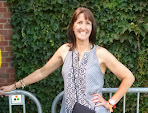The story thus far: Miss Irene and Big George volunteered to self-isolate, given their elevated at-risk status to the virus due to "accomplished age," in order to ease the youngsters' minds. That went about as well as could be expected.
Irene's
self-imposed home-isolation lasted a week, which was three days
longer than Julie expected. Trey won the family's “Jail Break”
pool, although charges of collusion were raised when it was
discovered that he brought Miss Irene a chocolate milkshake each of
the last three days.
On the eighth day,
as Julie was crossing the back yard from her apartment over the
garage to the main house, she was nearly run over by Miss Irene, who
was headed in the opposite direction, dressed in motorcycle leathers
and carrying a full-face helmet.
“Let's take The
Scout on deliveries today,” she said, handing Julie a cup
half-filled with coffee. “I'll load up while you finish your
coffee.” Julie wanted to say that she couldn't finish her
coffee until she started it, but she recognized that
determined look on Miss Irene's face and knew resistance was futile.
By the time Julie gulped the lukewarm coffee and entered the garage,
Miss Irene was sitting in the sidecar, ready to go.
It was a beautiful
day for a motorcycle ride. The sun was shining brightly – the first
sunny day they’d had in weeks – and it was warm . . . -ish, or at
least warm-er than it had
been. Spring was more fickle than usual in its arrival, as if
it, too, was practicing social distancing. Winter-weary Iowans, tired
of being cooped up by ice storms and bitter wind-chills, were forced
to extend their stays indoors not only by fear of the virus, but by
weeks of gloomy, overcast skies. Cabin fever was rampant.
Miss Irene's first
week of “house arrest,” as she called it, had been more difficult
than she expected. She was used to attending kaffeklatsch at
the bakery at least three times a week – Tuesdays were reserved for
church meetings, Thursdays for beauty shop appointments. That week
she had ventured no further than the edge of her porch. Although she
was in constant phone contact with friends and informants, she had no
physical contact with anyone outside her immediate family (and
Julie). Virtual socialization proved effective and efficient for
coordinating donations and distributions of food, money and supplies
for virus relief, but it left Miss Irene with a vague feeling of
emptiness.
Julie, meanwhile,
had been Miss Irene's boots on the ground, running errands and making
deliveries for people who were unable to leave their homes. Her
“outdoor” time had been spent driving Miss Irene’s 1980s
Lincoln Town Car – which Julie thought was big enough to deserve
its own zip code and created its own weather patterns.
Julie's social contact
– virtual or otherwise – had been just as limited, if not more
so, than Miss Irene's. When Julie picked up supplies, there was
barely time for a mask-muffled hello or a tired wave. And when she dropped off deliveries – setting them on the edge of porches, a
safe distance from entryways – the recipients were shadows in darkened windows or foreheads and eyes peering cautiously
from behind curtains. Julie felt claustrophobic, constricted by her
own skin. She didn't necessarily want to socialize or travel,
but she missed the potential for socialization and travel.
Even The Scout
seemed anxious to get out of the house . . . or garage. Big George
kept the 1941 Indian Sport Scout motorcycle running better than new,
but cold starts could sometimes be difficult. That morning she
started on the first kick and settled in to a throaty purr. After
several adjustments, she still wanted to run fast so Julie gave in,
goosed the throttle and let her have her head. The exhaust rang out
joyfully as they accelerated through the corners, echoing through the
deserted streets.
The Scout was a
beautiful motorcycle with glossy black paint set off by white tire
skirts and sparkling chrome accents. Julie watched the workers' faces brighten when The Scout pulled into the pick
up lane. The sidecar seemed to expand to hold all the packages and Miss Irene.
As they set out for deliveries, Julie noticed more and more people out in their yards –
whether lured out by the warm weather or, as she imagined, by The
Scout's siren song. They paused their raking to watch The Scout pass
by, reassured by the familiar sight. “We turn more heads than the
ice cream truck,” Miss Irene boasted. When Julie placed the
packages on porches, she caught her first glimpse of the recipients
as they smiled and waved – albeit from behind closed doors.
By the time they
returned home, Big George and Trey had set up a “clean room” in
the garage for Big George, who had been providing mechanical advice
via phone while in self-isolation. “There are a few problems even I
can't solve over the interwebs,” Big George said with a twinkle in
his eye. Coincidentally, Trey had picked this day in the family's
“Jail Break II: Big George Is Back In Town” pool.
The next time Julie
took The Scout on deliveries, people chatted with her from behind
their screen doors. And the next time, they stood just outside their
doors to visit. Even as the number of deliveries started to decrease,
the time it took to make those deliveries increased.
Soon after that,
virus-relief efforts in Pleasant Glen took on a new challenge. Miss
Irene coordinated neighborhood walks which featured scheduled “stop
and waves” or “stop and chats” – from sidewalk to porch –
bringing bringing back the old-fashioned, small town notion of
socializing, distantly.
To be continued...
For more stories about life in (fictional) Pleasant Glen, read my novel Scout's Honor and the soon-to-be-published Scout's Redemption.


No comments:
Post a Comment